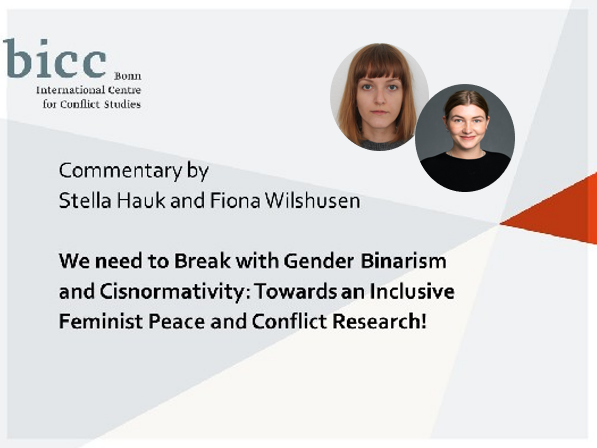Press releases
Commentary \ We need to Break with Gender Binarism and Cisnormativity: Towards an Inclusive Feminist Peace and Conflict Research!
For over a hundred years, the 8th of March marks the feminist day of struggle, nowadays still mainly celebrated as International Women’s Day. Although we have come far, the sole reference to ‘women’ is problematic since it reproduces a gender binary that excludes anyone that does not identify with the sex assigned to them at birth, i. e., transgender (in short: trans) and non-binary individuals. This tends to undermine and even deny the day’s aim to fight sexism and misogyny in all its forms.

In their commentary, the authors Stella Hauk and Fiona Wilshusen argue that it is high time to incorporate trans and non-binary perspectives systematically into peace and conflict studies as they are among the most vulnerable groups in times of peace and conflict. They are a highly targeted group when it comes to gender-based violence (GBV). Violence against them often follows the same pattern as violence against cis-women, but is far less recorded. Existing data suggests that between January 2008 and September 2021 at least 4,042 trans and non-binary people were killed. In 2021, the number of trans and non-binary people killed reached its climax with 375 individuals, a seven per cent increase to the previous year.
The commentary emphasises that during conflict, non-binary and trans people are most likely affected by varying degrees of social, economic, political, symbolic and structural exclusion and violence. In many cases, trans and non-binary refugees suffer severe discrimination, for example in refugee camps or in contact with authorities. In addition, aid and other humanitarian services fail to consider the particular needs of trans and non-binary people. Furthermore, researchers complain that searching the term ‘transgender’ in leading journals of peace and conflict studies only leads to very few results.
The authors of the commentary therefore call for a more inclusive feminist approach within peace and conflict studies that highlights and acknowledges the struggles of trans and non-binary people, as this would also help to improve the overall understanding of dynamics of violent conflict.
Find the commentary “We need to Break with Gender Binarism and Cisnormativity: Towards an Inclusive Feminist Peace and Conflict Research!” here.
The commentary emphasises that during conflict, non-binary and trans people are most likely affected by varying degrees of social, economic, political, symbolic and structural exclusion and violence. In many cases, trans and non-binary refugees suffer severe discrimination, for example in refugee camps or in contact with authorities. In addition, aid and other humanitarian services fail to consider the particular needs of trans and non-binary people. Furthermore, researchers complain that searching the term ‘transgender’ in leading journals of peace and conflict studies only leads to very few results.
The authors of the commentary therefore call for a more inclusive feminist approach within peace and conflict studies that highlights and acknowledges the struggles of trans and non-binary people, as this would also help to improve the overall understanding of dynamics of violent conflict.
Find the commentary “We need to Break with Gender Binarism and Cisnormativity: Towards an Inclusive Feminist Peace and Conflict Research!” here.


